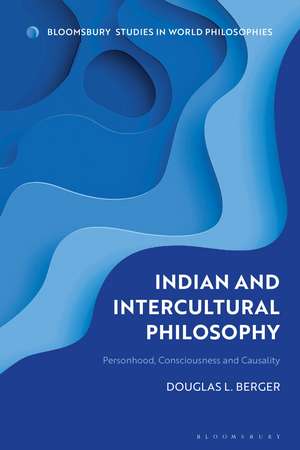Indian and Intercultural Philosophy: Personhood, Consciousness, and Causality: Bloomsbury Studies in World Philosophies
Autor Douglas L. Bergeren Limba Engleză Paperback – 22 feb 2023
| Toate formatele și edițiile | Preț | Express |
|---|---|---|
| Paperback (1) | 191.38 lei 6-8 săpt. | |
| Bloomsbury Publishing – 22 feb 2023 | 191.38 lei 6-8 săpt. | |
| Hardback (1) | 569.06 lei 6-8 săpt. | |
| Bloomsbury Publishing – 11 aug 2021 | 569.06 lei 6-8 săpt. |
Preț: 191.38 lei
Preț vechi: 249.39 lei
-23% Nou
Puncte Express: 287
Preț estimativ în valută:
36.62€ • 38.02$ • 30.54£
36.62€ • 38.02$ • 30.54£
Carte tipărită la comandă
Livrare economică 24 martie-07 aprilie
Preluare comenzi: 021 569.72.76
Specificații
ISBN-13: 9781350253995
ISBN-10: 1350253995
Pagini: 240
Dimensiuni: 156 x 234 x 25 mm
Greutate: 0.34 kg
Editura: Bloomsbury Publishing
Colecția Bloomsbury Academic
Seria Bloomsbury Studies in World Philosophies
Locul publicării:London, United Kingdom
ISBN-10: 1350253995
Pagini: 240
Dimensiuni: 156 x 234 x 25 mm
Greutate: 0.34 kg
Editura: Bloomsbury Publishing
Colecția Bloomsbury Academic
Seria Bloomsbury Studies in World Philosophies
Locul publicării:London, United Kingdom
Caracteristici
Encourages intercultural studies of personhood, knowledge and causality Indian philosophy by prioritizing thier place in Indian classical texts and commentaries rather than seeking to understand how they have been understood in modern Anglophone scholarship
Notă biografică
Douglas L. Berger is Professor of Global and Comparative Philosophy at Leiden University, The Netherlands. He is author of The Veil of Maya: Schopenhauer's System and Early Indian Thought (2004) and Encounters of Mind: Luminosity and Personhood in Indian and Chinese Thought (2015), and co-editor, with JeeLoo Liu, of Nothingness in Asian Philosophy (2014).
Cuprins
Introduction PART I: CLASSICAL BRAHMINICAL THOUGHT 1. Shedding Light on the Matter: Sankara's Dualistic Atman 2. The Abode of Recognition: Memory and the Continuity of Selfhood in Classical Nyaya Thought. 3. How Do We Sense? Buddhist and Nyaya Theories of Imagination PART II: CLASSICAL BUDDHIST THOUGHT 4. What Kind of a Designation is 'Emptiness?' Reconsidering Nagarjuna's MMK 24:18 5. The Social Meaning of the Middle Way: B.S. Yadav and the Madhyamika Critique of Indian Ontologies of Identity and Difference 6. Justice, Deconstruction and Aporia in Nagarjuna's Empty Ethics PART III: INDIAN PHILOSOPHY IN INTERCULTURAL PERSPECTIVES 7. Early Brahminical and Confucian Ideas of Duty 8. Indian and Chinese Conceptions of Luminous Awareness 9. The Unlikely Commentator: The Hermeneutic Reception of Sankara's Thought in the Interpretive Scholarship of Dara Shukoh 10. The Pivot of Nihilism: How Nietzsche Mis-Evaluates Early Buddhist Thought Bibliography Index
Recenzii
This book is a result of many years of sustained thought on intercultural philosophical issues across several traditions. Berger's humane and sensitive scholarship, broad sympathies, and wide understanding are everywhere evident. This is a book from which there is much to learn for all those committed to a global future for philosophy.
What is unique in Berger's pellucid but provocative, erudite but elegant, argument-rich yet accessible philosophical essays is a four-dimensional crossing of boundaries: between Indian, Chinese, and European philosophies, between epistemology, metaphysics, and ethics, between distinct traditions of Brahminical (Nyaya and Vedanta) and Buddhist philosophies, and between analytical and continental styles of philosophy. Berger's 'bridge-work' in philosophy will make a difference because he never loses sight of the internal differences among each of the traditions or schools.
What is unique in Berger's pellucid but provocative, erudite but elegant, argument-rich yet accessible philosophical essays is a four-dimensional crossing of boundaries: between Indian, Chinese, and European philosophies, between epistemology, metaphysics, and ethics, between distinct traditions of Brahminical (Nyaya and Vedanta) and Buddhist philosophies, and between analytical and continental styles of philosophy. Berger's 'bridge-work' in philosophy will make a difference because he never loses sight of the internal differences among each of the traditions or schools.









